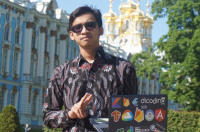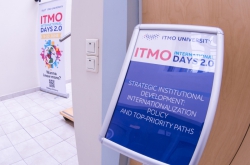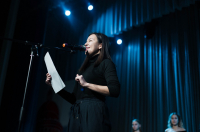What made you want to come to St. Petersburg and to ITMO University in particular?
At my university, in order to receive a diploma one has to spend three months working at a company abroad or studying at a foreign university. I’ve wanted to visit Russia for a while now and it turned out that my university is partners with ITMO University. I saw this as a great opportunity to spend some time in a different country while working on my education. Here, in St. Petersburg, I am working on an individual project with Andrey Karsakov, who is my scientific advisor, from the Computer Technologies Department.
Tell us more about what kind of research you’re working on here
I visualize data that was collected by ITMO’s research team last summer at VK Fest. My first task was to get a grasp of how visualization instruments even work. I haven’t had any experience using such software in my earlier studies. The end goal is to create several graphs that would, among other things, show the number of posts on the Internet about the festival during the time it was held. Then, I think, I will need to implement a more interactive way of visualizing the data. For my work, I’m using the 3dGS graphics toolkit and I also write code in Java Script. I haven’t used this language much before, so now I’m honing my skills. I find this project interesting since I’ve been learning so many new things while working on it. At the same time it’s kind of a personal challenge for me: since I specialize in computer science, any other skills that other students or young specialists lack will give me an advantage on the job market. I think it’s cool that I am learning not only how to develop data analysis software, but how to demonstrate the results of such analysis in a way that is accessible to most people.

ITMO's experiment at VK Fest 2016
Have you already picked a topic for your master’s thesis?
We don’t write theses at ESIEE; instead, to receive one’s diploma, students need to pass their exams and complete a six-month internship at some company. There, they would have the same responsibilities as the rest of the employees. During our education, we get to pick elective courses. Some of them entail working on small research projects with a scientific advisor. Therefore the French education model is more practice-oriented. On the other hand, I suppose if a student wants to apply for a postgraduate program later, they would benefit from working on a Master’s thesis since it would prepare them for serious scientific work that involves a lot of theoretical work. So I think it’s great when students have the opportunity to hone their skills in real-life situations and to perform some research work, too.
And is there a difference between Russia and France in terms of approach to education and communication?
Something that caught my attention almost instantly is that students and professors are friendlier with each other and their relationship tends to be less formal here. When I had just come to Russia, I had to send a lot of e-mails and noticed that people here tend to take their time answering them. I had asked an acquaintance, who speaks French and has already been in Russia for seven years, what I should do, how should I contact my professor. He told me to simply call them on their cellphone. In France that’s different. It would be strange for a student to know their professor’s phone number. People there don’t expect you to contact them in any way other than e-mail. So I was very surprised to see students at ITMO being more informal with their professors. And I think that’s cool.

How much time do you spend on your project work? Do you have any free time left?
It depends. Oftentimes you feel like you’re making great progress when suddenly you stumble upon an obstacle you can’t overcome without asking your advisor for help. That means having to wait for him to answer my e-mail or find the time for a consultation. When I had first begun my studies here, my scientific advisor was very busy since he had to participate in his students’ thesis defenses, which made my research stall at times. But these days his schedule is not as busy.
Do other students help you?
Well, to be honest, I don’t often get to talk to other students at the university itself, since I have an individual project. But I do live at a dorm with other international students. My roommate is from Benin and he speaks French, although he’s already spent some time in Russia and he speaks Russian fluently. He helps me with everyday stuff; for example, he explains to me how to use public transport here and sometimes we go visit the various sights and landmarks here. He’s also very much into basketball, so I play quite a bit, too.

Has your roommate tried to teach you Russian?
No, we mostly tend to speak in French with each other. I’ve tried to learn a few phrases in Russian, but I couldn’t commit to it. I like the language – to me, as a foreigner, it sounds a lot like German in its “roughness”. But it’s very different from other languages like Spanish or Italian.
How do you spend your free time?
I go to bars, cafes; I’ve been to a lot of the cultural sights in the city. St. Petersburg is a very great city for tourists – the “density” of landmarks here is really high. Meaning that if you’ve only got a couple of days to see it, you can still cover a lot of ground since so many sights are right next to each other. What did surprise me is that in a lot of tourist-heavy places, like museums, the staff have a very poor grasp of English. I also want to visit Finland while I’m here since it’s so close. I love traveling in general: I’ve been to many places in Europe as well as to Turkey and Egypt and I can say with absolute certainty that St. Petersburg is a very European city in both architecture and nature. It’s a lot like Berlin in some way. I feel quite comfortable here, in the sense that I didn’t have to radically change any habits of mine; many things are a lot like at home.





